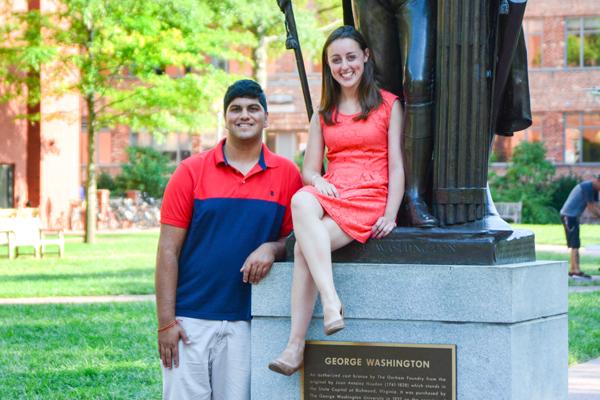After five years of record participation in the senior classes’ fundraising campaigns, this year’s coordinators want seniors to commit to donating past graduation.
Lindsay Goodman and Pranav Nanda, the coordinators of the Class of 2017’s campaign, said they will encourage seniors to commit to yearly sustaining donations, rather than just one-time pledges. The focus on sustainable gifts over pledges is a shift from past senior classes’ priority of setting participation records for one-time gifts.
Goodman and Nanda said the campaign emphasizes “thinking forward while giving back” by instituting a mentality of philanthropy in recent graduates.
“A sustaining gift, no matter what amount, encourages a culture of philanthropy and loyalty to the University,” Nanda said.
Goodman and Nanda hope to attract students by encouraging seniors to donate to the programs and organizations that matter to them, they said. Seniors can donate in honor of faculty members and send favorite professors notes explaining why their help made students want to give back to the University.
Goodman added that she hopes to encourage undecided student donors to support student financial aid funds, like the Power & Promise scholarship and the University’s internship grant fund. University-wide fundraising campaigns are focusing on these areas in 2017, too: Officials said last month that they will focus on fundraising for student aid during University President Steven Knapp’s last year at GW.
The coordinators said they understand that sustainable giving may not always be possible for the Class of 2017, even after seniors have made their pledges.
“Situations change. We know that. You’re not stuck in it forever,” Goodman said. “Instead, you would be giving as long as you are able.”
Some of GW’s peer institutions, including the University of Miami, American University and New York University, give seniors the option to pledge recurring gifts but rarely focus on increasing sustainable gift rates. Others, like Duke University and the University of Southern Carolina, don’t offer seniors the option to pledge recurring donations.
Matthew Fernandez, the assistant director of annual giving at the University of Miami, said encouraging current students to commit to sustained gifts can be a challenge because seniors do not know what their financial stability will be after graduation. Sustainable pledges from students are not anywhere near as common as one-time gifts, he said.
“One-time pledges understand the cause, and they donate now because they want to give,” Fernandez said. “Sometimes they don’t know where they’re going to be next year. Some people want to give and they don’t want to think about it, so they give a recurring gift. My stance is that it’s a personal choice.”
Kelly Smith, the coordinator of young alumni and student programs at Duke University, said in an email that high participation rates in student giving campaigns remains important because students are hesitant to donate large gifts while they are still paying for their educations.
“There is no doubt that the cost of higher education is rising, and I believe that brings some hesitation,” Smith said. “However, this is why participation, not dollars raised, is the focal point of many senior gift campaigns across the country.”
Participation rates for GW’s campaign have steadily risen in recent years. Last year’s campaign turned out the highest participation in recent history, with nearly 63 percent of the Class of 2016 donating a total $87,553. Goodman and Nanda have not set specific goals for class participation rates but said they hope a majority of the class donates.
Last year, 32 percent of Duke’s senior class participated in their giving campaign, Smith said. She said encouraging students to give while still in school is “vital” for securing donors who will give back enthusiastically after they graduate.
“Data tells us that a majority of today’s major gift donors began giving back to their alma maters at a young age, including a senior gift,” Smith said. “By giving as a student, they have firsthand experience of what gifts do for the university.”







